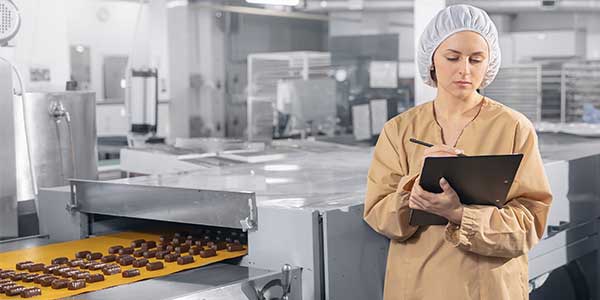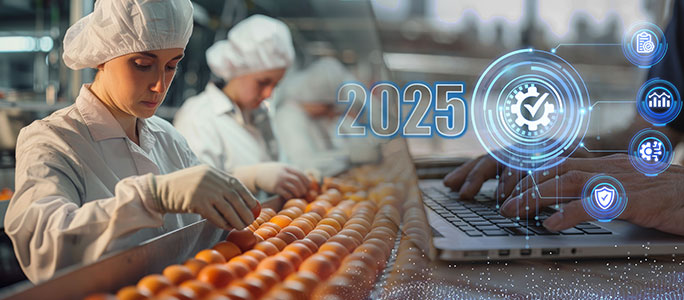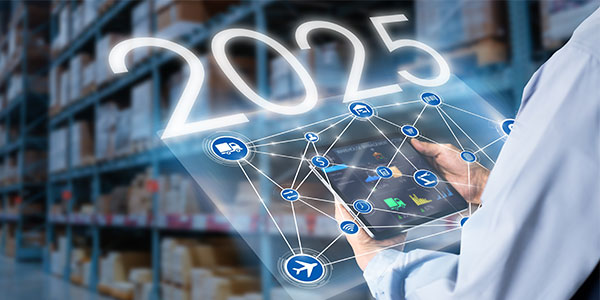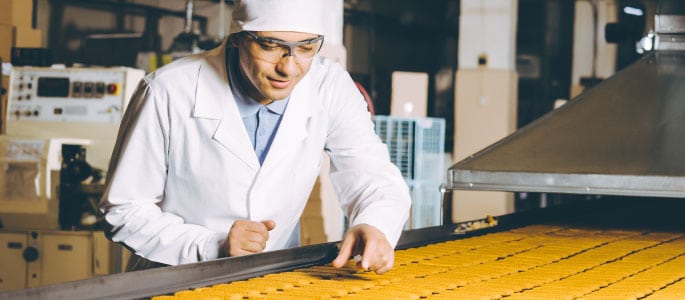
Even as a New Year has dawned, the massive food & beverage manufacturing industry continues to remain in a volatile state.
The ramifications of the pandemic are still being felt, and are likely to influence everything- from consumers’ food choices to manufacturers’ ability to meet demand, in 2022 as well.
Despite these headwinds, food manufacturers can still find their footing by transforming their manufacturing operations with the help of a Food ERP software.
Table of Contents:
- Overview
- Challenges food manufacturing businesses have been facing
- COVID-19 has only amplified the challenges
- Food ERP software: The need of the hour
- How does a Food ERP help them transform their manufacturing operations?
- Conclusion
Overview
The food & beverage manufacturing industry is extremely vast, diverse, and multifaceted. Home to a number of sub-sectors and micro-verticals, the industry is one of the largest globally, the biggest in the process manufacturing sector, and has a number of stakeholders.
ALSO READ: Food Manufacturing ERP Increases Efficiency & Productivity
In terms of numbers, the global food and beverages manufacturing market was valued at well over US dollars 6 trillion* in 2021, and growing at a CAGR of 7.1%, it is expected to be placed at over US dollars 8 trillion in 2025. Now these are astonishing numbers!
Just to put things into perspective, and give you an idea on what a trillion means, one trillion seconds equals to 31,688 years, and US dollars 6 trillion was USA’s federal spending for the entire year in 2021. That’s how big the industry is, and so are its problems.
ALSO READ: Transform Your Food Manufacturing Business with Web-based Food ERP Software
Challenges food manufacturing businesses have been facing
The food & beverage manufacturing industry has traditionally faced a number of challenges. These challenges include operating on razor-thin margins, dealing with the fickle and increasingly aware consumers, need for constant innovation and sustainable manufacturing, et al.
The challenges don’t end here, as there are the long as well as complex supply chains, the ever so stringent regulatory & food safety requirements, the need to manage and control the inventory that comes with shelf life, etc.
Despite the presence of such ominous challenges, the food and beverages manufacturing businesses have done exceedingly well. However, past couple of years have been extremely tough on the industry, ever since the outbreak of the COVID-19 pandemic.
Pandemic has only amplified the challenges
The onset of COVID-19 amplified the existing challenges, and brought in some fresh ones for the food & beverage manufacturing firms. From changing customers’ consumption habits to affecting manufacturers’ ability to meet demand, it made a huge impact on the industry.
Many businesses struggled to sustain their everyday operations while ensuring food and employee safety, and adherence to regulatory requirements. Their long-term growth plans got side-lined to accommodate the immediate business continuity plans.
Now, with the pandemic entering into its third year, the food & beverage manufacturing industry continues to struggle on many fronts. It is yet to come to terms with the wide-scale supply chain disruption, and finds itself under tremendous pressure to do more with less.
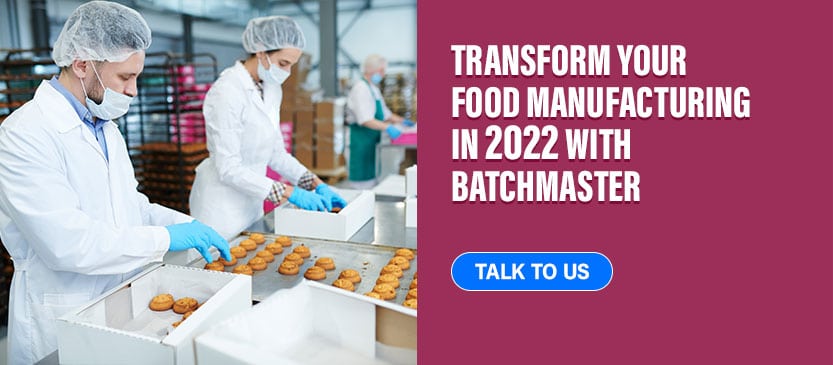
Food ERP software: The need of the hour
A food manufacturing ERP software has reestablished itself as a vital tool for the food manufacturers in these times, allowing them to perform a number of tasks such as making their supply chain resilient, increasing manufacturing and product flexibility, ensuring quality, and analyzing risks.
More importantly, an ERP software for food industry has helped food manufacturing businesses prepare for anything in the future — a pandemic-like situation, stricter regulations, greater consumer demand, anything — by making them more flexible, and agile, and hence, ready for change.
A food ERP software can guide the food manufacturers to develop economical yet quality products, ensure supply chain transparency, enhance profitability, and meet the consumer expectations along with the food safety and regulatory requirements. But how exactly does it do all of it?
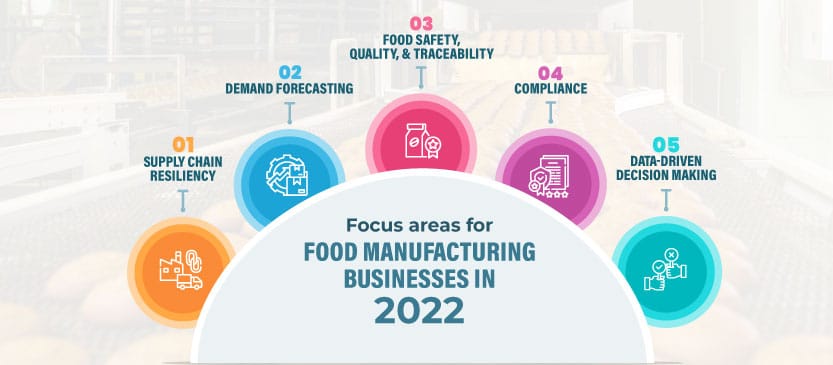
Below are five ways through which a food manufacturing ERP software can transform food manufacturing industry, and ensure that the food manufacturing businesses succeed in 2022, and beyond. Take a look:
By helping build resilient supply chains
Food manufacturers have been looking to minimize the disruption and reinstate flow continuity by adding more resilience to the supply chain.
By investing in omnichannel capabilities, creating a leaner product range, and investing in supplier relationships, they are essentially freeing up time & resources, which could be invested in developing new, sustainable products.
An ERP software for food industry can help with these initiatives, by synchronizing the supply chain with the procurement, manufacturing, and distribution processes, and offering operational flexibility the businesses require to produce innovative products.
It also allows manufacturers to maintain multiple verified suppliers, and end their reliance on a single source of supply.
Additionally, by offering a platform for more instinctive communications, better lead times, advance warnings for quantity adjustments, and more dependable predictive modelling, an ERP software for food manufacturing helps create a resilient, flexible, and responsive supply chain, so as to prevent any future supply chain crisis.
By helping with accurate demand forecasting
What the pandemic has done is that it has made it difficult for the food manufacturers to understand the consumption patterns of the customers, and so, made it impossible to accurately forecast the demand.
That is precisely why the food manufacturing industry today needs demand forecasting tools more than ever before.
A food ERP software can equip food manufacturers with the relevant data that can be converted into actionable, forward-looking, and realistic demand planning, which can further help them balance supply & demand effectively, meet seasonal and varying demands, and keep the supply chain robust and agile.
By laying greater emphasis on food safety & quality
COVID-19 has put greater focus on the need to maintain food quality and safety. Consumers today are more concerned about the quality of the product they consume, and want virtually every single detail about its journey from farm to fork.
These considerations have brought the food safety, quality, and traceability aspects of food manufacturing under greater scrutiny.
Only a food manufacturing software can help manufacturers cover all these aspects. It allows ensuring quality by putting in quality checks at all stages, and ensuring traceability by tracking the ingredients bi-directionally across the supply chain, and trace the data throughout the entire flow of production, and thus ensuring the safety of the products at any given time.
By helping meet regulatory requirements
The pandemic has forced the regulatory bodies across the globe to tighten the norms related to the launch of healthy products, food labels, maintaining hygiene at the plant, etc.
This has been done with the aim of denying entry of unsafe products into the market, and reviewing food manufacturing business’ previous compliance history.
Investing in an ERP software for food manufacturing can help the manufacturers meet all the evolving local, national, and global regulatory compliance requirements not just now, but in the future as well, thus keeping the businesses in safe waters, all the time.
By facilitating data-driven decision making
Food manufacturing ERP systems collect, store, and analyze data in huge quantities. While this in itself is valuable, the ERP systems take it further with their reporting and real-time analytics functionalities, offering the food manufacturing businesses a basis for making informed, timely, and most importantly, proactive decisions, rectify mistakes, and seize the market opportunities.
Conclusion
With the pandemic still being around, the food manufacturers are likely to face a tough time in 2022, and possibly beyond, unless they opt to transform their business operations with the help of an ERP software.
At BatchMaster, we bring all our experience of over three decades into our micro-verticalized, industry-tailored ERP solutions for different food & beverage manufacturing businesses.
Learn more about what our solutions do for the food & beverage manufacturing businesses in particular, and the process manufacturing industry in general, by writing to us.


